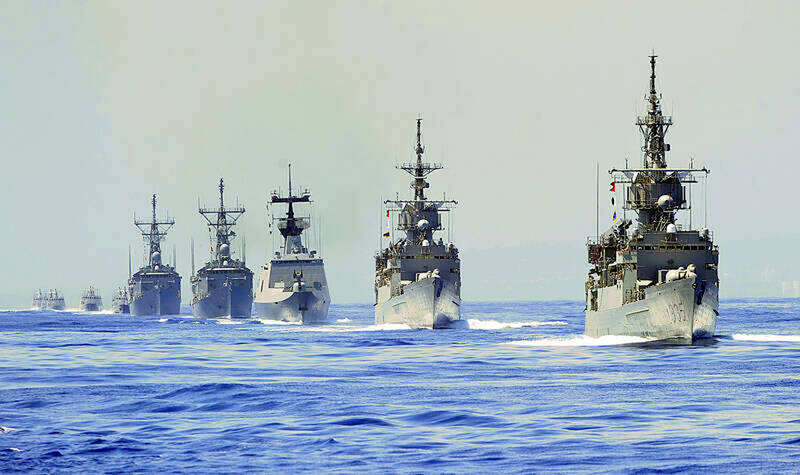Taiwanese defense experts have called for the nation to prioritize self-defense capabilities and missile acquisition after President William Lai (賴清德) on Friday pledge to raise the defense budget to 3 percent of Taiwan’s GDP to acquire military platforms from the US.
Lai said the government would propose a special budget this year for the increase.
Observers said that might increase this year’s defense budget by NT$150 billion (US$4.57 billion).

Photo: Liao Chen-huei, Taipei Times
The defense budget for fiscal year 2025 currently stands at NT$647 billion, or about 2.45 percent of GDP.
Whether the proposed budget increase, which requires legislative approval, would materialize remains uncertain.
Institute for National Defense and Security Research research fellow Su Tzu-yun (蘇紫雲) on Friday applauded Lai’s decision to increase defense spending, adding that it sent a positive message to the international community.
However, Su said purchasing more arms from the US should be made with Taiwan’s strategic needs in mind.
Taiwan’s priority should be increasing its self-defense capabilities, such as precision-guided missiles, anti-surface and anti-air missiles, National Advanced Surface-to-Air Missile Systems and drones for all three services, he said.
Only then should Taiwan turn back to acquiring larger platforms, he said.
Taiwan Security Association Deputy Secretary General Ho Cheng-hui (何澄輝) said that even if the US were willing to sell significant platforms such as Aegis-equipped ships and F-35 fighter jets, Taiwan would not receive them for another decade.
Taiwan should ask for technology transfers from the US, such as acquiring the blueprints for the Arleigh-Burke class frigate and the Aegis system or work with the US on joint manufacturing of naval ships equipped with the Aegis system, he said.
The nation should increase its storage capacity for missiles and step up training with the US, he added.
Asked about China’s increasing use of “gray zone” tactics, Ho said foreign think tanks’ suggestions of the air force increasing deployment of P-3C Orions were viable suggestions.
Alongside the nation’s indigenous uncrewed submarine development project, codenamed “Huilong” (慧龍), the nation should also consider purchasing more uncrewed submarines from the US to increase patrol frequency in the shallow waters west of Taiwan, which would also enhance the nation’s naval capabilities, Ho said.
Kuo Yu-jen (郭育仁), deputy director of the Institute for National Policy Research, said that Taiwan, like other countries, is beginning to increase defense spending per the demands of US President Donald Trump.
Kuo said the government should create a cross-ministry US committee that includes representatives from the military, and economic and technology experts to help form national policies and strategic goals to better protect Taiwanese interests.
Additional reporting by CNA

“China is preparing to invade Taiwan,” Deputy Minister of Foreign Affairs Francois Wu (吳志中) said in an exclusive interview with British media channel Sky News for a special report titled, “Is Taiwan ready for a Chinese invasion?” the Ministry of Foreign Affairs said today in a statement. The 25-minute-long special report by Helen Ann-Smith released yesterday saw Sky News travel to Penghu, Taoyuan and Taipei to discuss the possibility of a Chinese invasion and how Taiwan is preparing for an attack. The film observed emergency response drills, interviewed baseball fans at the Taipei Dome on their views of US President

The Central Weather Administration (CWA) today issued a "tsunami watch" alert after a magnitude 8.7 earthquake struck off the Kamchatka Peninsula in northeastern Russia earlier in the morning. The quake struck off the east coast of the Kamchatka Peninsula at 7:25am (Taiwan time) at a depth of about 19km, the CWA said, citing figures from the Pacific Tsunami Warning Center. The CWA's Seismological Center said preliminary assessments indicate that a tsunami could reach Taiwan's coastal areas by 1:18pm today. The CWA urged residents along the coast to stay alert and take necessary precautions as waves as high as 1m could hit the southeastern

The National Museum of Taiwan Literature is next month to hold an exhibition in Osaka, Japan, showcasing the rich and unique history of Taiwanese folklore and literature. The exhibition, which is to run from Aug. 10 to Aug. 20 at the city’s Central Public Hall, is part of the “We Taiwan” at Expo 2025 series, highlighting Taiwan’s cultural ties with the international community, National Museum of Taiwan Literature director Chen Ying-fang (陳瑩芳) said. Folklore and literature, among Taiwan’s richest cultural heritages, naturally deserve a central place in the global dialogue, Chen said. Taiwan’s folklore would be immediately apparent at the entrance of the

ECONOMIC BENEFITS: The imports from Belize would replace those from Honduras, whose shrimp exports have dropped 67 percent since cutting ties in 2023 Maintaining ties with Taiwan has economic benefits, Ministry of Foreign Affairs officials said yesterday, citing the approval of frozen whiteleg shrimp imports from Belize by the Food and Drug Administration (FDA) as an example. The FDA on Wednesday approved the tariff-free imports from Belize after the whiteleg shrimp passed the Systematic Inspection of Imported Food, which would continue to boost mutual trade, the ministry said. Taiwan’s annual consumption of whiteleg shrimps stands at 30,000 tonnes, far exceeding domestic production, the ministry said. Taiwan used to fill the gap by importing shrimps from Honduras, but purchases slumped after Tegucigalpa severed diplomatic ties with Taiwan